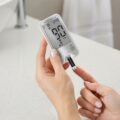Blood pressure and Sleep

Blood Pressure & Sleep: A Duo that Shapes Your Health
Have you ever wondered what your blood pressure has to do with your sleep? Probably not, right? But you might sometimes wonder why you wake up feeling unrested despite a seemingly long night. The answer could lie in the complex relationship between your blood pressure and your sleep.
Good sleep can lower your blood pressure, while a lack of sleep can keep your blood pressure high at night—it doesn’t drop as it should, which can lead to hypertension over time. Sure, we live in a non-stop society, with deadlines and constant availability — many of us don’t consider high blood pressure when we have trouble falling asleep or suffer from insomnia, but rather blame it on the “normal” everyday stress that keeps us from relaxing. But be careful: an undetected high blood pressure might be the culprit behind your sleep problems, without you even knowing it.
In our guide, we reveal the dynamic relationship between blood pressure and sleep. We’ll show you how to skillfully balance both, improve your sleep hygiene, and develop a deep understanding of your body’s mechanisms. This is about more than just good bedtime stories: it’s about re-evaluating your nights — they are a crucial time for your heart’s health.
Understanding How Blood Pressure and Sleep Work Together
Honestly, don’t you feel like a new person after a really good night’s sleep? It’s not just the restorative effect — your blood pressure plays a central role in that feeling. By better understanding how blood pressure and sleep are interconnected, we can take active control of our health and live a healthy life. Imagine your heart as an engine that also needs to cool down:
Deep Sleep and Blood Pressure: During deep sleep phases, blood pressure naturally drops by up to 20 percent. This nightly drop in blood pressure during sleep is called “dipping” and is pure recovery for your body: because you need less energy and oxygen, your blood vessels can relax a bit, and your heart can pump more slowly.
Non-Dipping – A Hidden Risk: However, in some people, this so-called “non-dipping” occurs, where this nightly drop in blood pressure during sleep doesn’t happen. Non-dippers are at a higher risk for heart disease because their heart has to work at full speed all the time.
Dream Phase: During REM phases (Rapid Eye Movement), where most dreams occur, blood pressure can rise again during sleep. This is perfectly normal for healthy people, as everything regulates itself. But if your blood pressure remains high during sleep, it indicates problems with your blood pressure regulation.
Too Little Sleep or Interruptions Disrupt This Healthy Rhythm: Your blood pressure may stay high all night during sleep, which harms your heart and increases the risk of serious diseases. A vicious cycle is created: consistently high blood pressure can lead to further sleep disturbances, which in turn increase blood pressure — a dangerous downward spiral that needs to be broken.
High Blood Pressure During Sleep and Daytime: It Doesn’t Have to Be This Way!
High blood pressure is really insidious because it shows no clear symptoms for a long time but has a huge impact on our quality of life. Our modern lifestyle — full of stress, little exercise, and unhealthy fast food — can exacerbate the problem, often leading to a vicious cycle of high blood pressure and poor sleep. Far too few people use blood pressure monitors!
And that’s exactly why not only we want to inform you: Every year in May, it’s World Hypertension Day, and in 2024 it’s under the motto “Measure Your Blood Accurately, Control It, Live Longer.” This day is a global wake-up call to show how crucial regular blood pressure monitoring is for good sleep and a long, healthy life.
And honestly: if you often feel burnt out despite getting enough sleep — why wait until the doctor measures it? Take control yourself! We recommend the BU 580 Connect Upper Arm Blood Pressure Monitor from medisana. This tool makes it easy for you to monitor your blood pressure at home. Just pair it with the VitaDock+ App 2.0, and you have all the data on your smartphone — smart health monitoring that’s fun and protects you.
And the wrist blood pressure monitors from medisana work just as easily. With these compact devices, you can quickly and easily draw conclusions between your blood pressure, your sleep, and your daily life. So, measuring blood pressure can be so simple — are you on Team “wait and see” or Team “recognize high blood pressure and take insomnia seriously”?
Do You Want to Improve Your Sleep? Tips and Facts to Balance Your Blood Pressure and Sleep
Sure, stress is a real spoiler when it comes to your blood pressure and sleep. The first thing to do is calm down. Create a pleasant atmosphere and also pay attention to optimal humidity in your bedroom — humidifiers can work wonders. Use aroma diffusers to wind down your day with lavender or chamomile and just make yourself comfortable. Here’s what you can try tonight and in the future:
Consistent Bedtimes: Get your body used to regular sleep and wake times. This regularity promotes stable blood pressure and sleep that is truly deep and restful.
Relaxation Before Bedtime: Incorporate routines like meditation, reading, or light yoga exercises into your evening. This reduces stress and prepares your body and mind for a good night’s sleep.
Workout and Exercise: Light to moderate physical activity improves your blood pressure, your sleep, and your entire cardiovascular system. But no intense workouts in the evening — it temporarily raises blood pressure.
Sleep-Optimized Diet: Avoid heavy, late dinners and caffeine in the evening. Optimal are light, nutrient-rich foods that naturally regulate blood pressure and ease your sleep.
Digital Detox: Turn off electronic devices at least an hour before bedtime. The blue light from screens can affect your sleep cycle and inhibit melatonin production.
Does a little nightcap help with falling asleep? Not really! Although it may make you sleepy in the short term, alcohol leads to a rapid pulse and high blood pressure — throwing your sleep phases completely off balance. Much better: get some fresh air! Outdoor activities not only positively influence your blood pressure, but your sleep also benefits from plenty of oxygen.
Blood Pressure, Sleep, and Self-Care: Do Something for Your Well-being
No more guessing how to improve your blood pressure and sleep. It’s time for a conscious self-care routine! High blood pressure is dangerous and a hidden risk that can have really severe consequences. Remember: every night is an opportunity for regeneration. Start actively managing your blood pressure and sleep now — because when it comes to health and well-being, you are the most important actor in your life.




